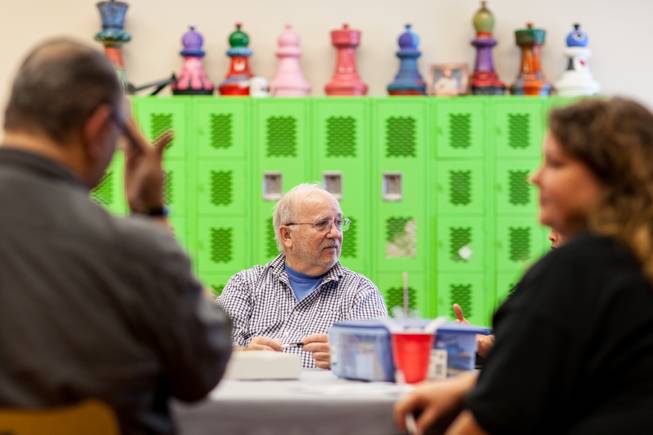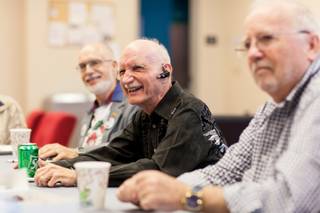
Krystal Ramirez
Participants discuss the future of the senior programming at the LGBTQ Center in Las Vegas on Dec. 11, 2014.
Sunday, Jan. 18, 2015 | 2 a.m.
When 64-year-old Gary Payne retired as a nurse, he encountered a problem many seniors face: boredom.
But as a gay man — he recently married his partner of 37 years — Payne said he didn’t feel entirely comfortable at Southern Nevada’s many senior centers. Most are filled predominantly with straight retirees.
“You feel like you’re the only person who is different,” Payne said.
ACT III senior drop-in schedule:
Free for people 50 and older.
• Men’s Mondays: 10:30 a.m.-2 p.m.
• Transgender Tuesdays: 10:30 a.m.-2 p.m.
• Women’s Wednesdays: 10:30 a.m.-2 p.m.
• Inclusive Thursdays: 10:30 a.m.-2 p.m.
• Free-for-all Fridays: 10:30 a.m.-2 p.m.
The Gay and Lesbian Community Center of Southern Nevada hopes to reach people like Payne with new senior programming. Called ACT III, short for “aging communities together,” the programming aims to provide a safe haven for people 50 and older who identify as lesbian, gay, bisexual, transgender, queer, intersex, asexual or two-spirit, as well as their allies, said Holly Reese, senior and transgender programs manager for the Center.
The programming, which launched in December, features sessions geared toward specific communities — “Men’s Mondays,” “Transgender Tuesdays” and “Women’s Wednesdays,” for example — and others open to all. Activities include guest speakers, self-defense classes, yoga and painting.
Reese spent several months calling other senior groups and LGBT organizations and posting fliers around the community to spread the word.
“People are going to make connections and build it up,” she said.
Her proof came the first week of programming when she saw a man befriend others and find a much-needed ride home from a medical procedure. The Center also asks seniors to fill out a survey to better understand their needs.
The number of lesbian, gay and bisexual seniors is expected grow to 3 million by 2030, according to the Movement Advancement Project, a think tank that researches and analyzes LGBT issues.
LGBT seniors are twice as likely to be single and three to four times more likely to be childless than their straight peers. As a result, some LGBT seniors lack financial security and help from caregivers, Reese said. Equality laws that haven’t kept pace compound the problem.
“Some seniors have been together for many, many years, and then their partner dies and they don’t have any rights to an estate or retirement or a pension,” Reese said. “If they lose their partner, they lose everything.”
But addressing financial worries isn’t the only focus of the program. For Payne and Holly Nesmith, a transgender woman, the activities offer something better — friendship and camaraderie.
“We don’t have to sit in the park and play checkers,” said Nesmith, 68, who is retired and eager to attend functions with her wife of nearly 46 years. “We’re vibrant people with lots of things to do and experience.”
With more seniors hanging out at the Center, Reese also anticipates conversations between older and younger generations — a chance to bridge a generational divide and have the two groups learn from each other.
“The younger generation takes for granted sometimes a lot of things the older generation has had to fight and spill their blood to get,” Reese said.


Join the Discussion:
Check this out for a full explanation of our conversion to the LiveFyre commenting system and instructions on how to sign up for an account.
Full comments policy